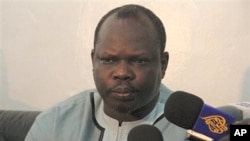With the announcement of preliminary results in Southern Sudan’s referendum, the south is now starting to prepare for independence. The south’s ruling party faces a wide range of challenges.
Full preliminary results in the January referendum were announced on Wednesday, and the votes in favor of secession were nearly 99% of the 3.8 million valid votes.
Sudan’s government, the African Union, and east Africa's Intergovernmental Authority on Development have all recognized the results. And while the results won't be official until February 7 at the earliest, it seems that everyone is ready to move on.
Pagan Amum, the secretary-general of the south's ruling party, the Sudan People’s Liberation Movement, said the referendum reflected the will of the people and that it is time to prepare for independence.
"Definitely, in terms of nation-building, as you all know, there are no schools where you go and learn nation building, there are no textbooks where you can learn from," said Amum.
The referendum was the centerpiece of a 2005 peace deal that ended two decades of civil war between north and south.
The vote took place from January 9 to 15 and was widely praised as peaceful and transparent. However, the first day of voting was overshadowed by fighting in the disputed border region of Abyei.
Residents there were once scheduled to vote on whether to stay part of the north or join an independent south.
But the Abyei poll was cancelled because of disagreements over who was eligible to vote. The SPLM says only the permanent residents of Abyei, the historically southern Ngok Dinka, should cast ballots. The north says the northern nomadic tribe Misseriya should also vote.
According to Amum, Abyei residents will know within two months whether a vote will happen or whether the north and south can reach a political deal. The future of Abyei, where southern residents have clashed frequently with the northern-supported nomads, is considered the likeliest spark for a renewal of war in Sudan.
The south sees last month's successful referendum as a chance to change the way north and south relate to each other.
"We take the outcome and the results of the referendum as a real good opportunity, a historical opportunity, to reset the relations between the south and the north into relations of mutual respect and cooperation and realization of common interest," added Amum.
The SPLM is also likely to face domestic resistance as a new constitution is put into place and a national government is created. With the recent formation of a committee to amend the south’s interim constitution, in place since 2005 but set to expire in July, the SPLM has come under fire for excluding opposition parties and civil societies.
Amum assured southerners that this was not the SPLM’s intention.
"Nobody intends to exclude any political party here," he said. "The SPLM is for an inclusive nation-building process for Southern Sudan."
Whether that is true or not, the south faces huge challenges in the months ahead as it tries to build a new nation.
South Sudan to Face Stiff Challenges




